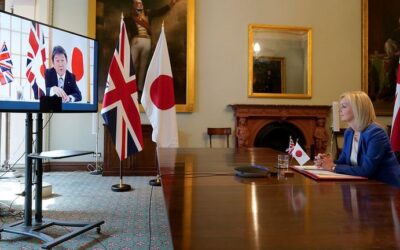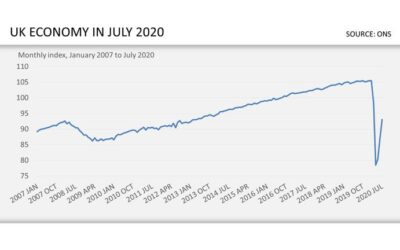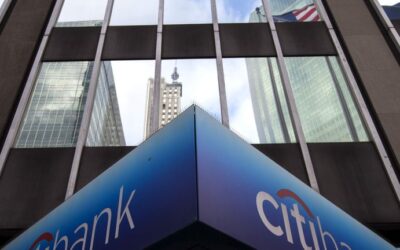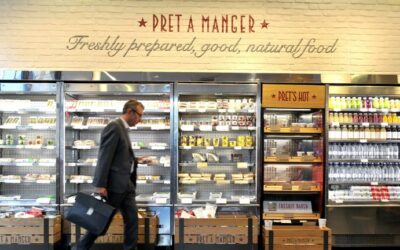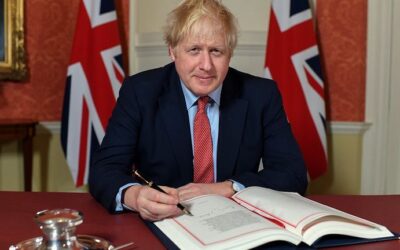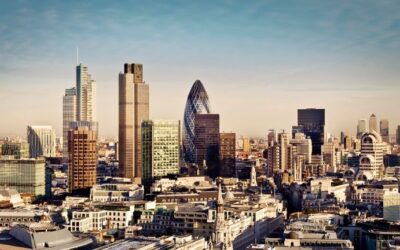The UK has secured its first post-Brexit trade deal following an agreement with Japan.
The government claimed the agreement will boost trade with Japan by £15.2bn over the next 15 years and UK businesses will enjoy tariff-free trade on 99% of exports to the country.
International Trade Secretary Liz Truss agreed the deal, in principle, with Japan’s foreign minister Toshimitsu Motegi on a video call on Friday morning.
Image: Ms Truss pictured in talks with Japan Foreign Minister Toshimitsu Motegi in June Pic: Andrew Parsons / 10 Downing Street
Ms Truss said the deal “goes far beyond” the EU-Japan trade deal that the UK will leave at the end of this year, when the Brexit transition period ends.
She also hailed the agreement as an “important step” towards the UK joining a wider 11-nation trade deal, known as the Comprehensive and Progressive Agreement for Trans-Pacific Partnership.
Advertisement
Prime Minister Boris Johnson tweeted: “We have taken back control of our trade policy & will continue to thrive as a trading nation outside the EU.”
Government analysis found that a deal with Japan would boost the UK’s GDP by around 0.07% over 15 years and increase UK workers’ wages by £800m in the long run.
More from Brexit
The agreement comes as the UK’s negotiations over a post-Brexit trade deal with the EU continue to stall, with both sides admitting on Thursday that “significant” differences remain in key areas despite the completion of eight rounds of talks.
:: Subscribe to the All Out Politics podcast on Apple Podcasts, Google Podcasts, Spotify, Spreaker
Department for Trade figures reveal that in 2018 the UK’s trade with the EU was worth £659.5bn – while trade with Japan was worth £29.1bn.
Challenged as to whether the estimated £1.5bn uplift to UK GDP over 15 years from a Japan deal was significant – considering it is a fraction of NHS spending – trade minister Greg Hands told Sky News: “This is the first of what we hope will be a series of deals.
“Our Conservative manifesto commitment is for 80% of UK trade to be covered by such deals within the next three years.”
Ms Truss said on Friday: “This is a historic moment for the UK and Japan as our first major post-Brexit trade deal.
“The agreement we have negotiated – in record time and in challenging circumstances – goes far beyond the existing EU deal, as it secures new wins for British businesses in our great manufacturing, food and drink, and tech industries.”
Japan deal a ‘stepping stone’ to CPTPP goal
She added: “From our automotive workers in Wales to our shoemakers in the North of England, this deal will help build back better as we create new opportunities for people throughout the whole of the UK and help level up our country.
“Strategically, the deal is an important step towards joining the Trans-Pacific Partnership and placing Britain at the centre of a network of modern free trade agreements with like-minded friends and allies.”
The news of an agreement is a breakthrough after suggestions last month that negotiations had stalled over access to food and agricultural products.
It was reported that the UK had sought better terms for blue cheeses but Japan wanted to keep to existing EU tariffs.
Image: The agreement includes protections for Melton Mowbray pork pies
Asked whether the UK will now be able to export more agricultural produce to Japan than it could while an EU member, Mr Hands replied: “I believe we will.”
He added: “We’ve secured geographic indicators for 70 products rather than just seven, including Cornish pasties, including Melton Mowbray pork pies – a lot of iconic British produce.
“In terms of the actual tariff-rate quotas involved, we’ve got really good access on pork, on beef.
“There’s £430m worth of food and drink exports to Japan each year from the UK.
“We’ve got key continuity and improvement across most of those produce, so I think it’s good news for agricultural exports into Japan.”
Emily Thornberry, Labour’s shadow international trade secretary, welcomed the UK-Japan agreement.
But she added: “Necessary as this agreement is, the government’s over-riding priority has to be securing the oven-ready deal that they promised us with Europe, which Japanese companies like Nissan have told us is crucial to the future of the investment and jobs they bring to Britain.”
Liberal Democrat trade spokesperson Christine Jardine MP said: “”The agreement’s economic contribution will be a drop in the ocean.
“The government has failed to leverage any meaningful benefit from its independent trade policy, whilst a deal protecting our EU trade is nowhere in sight.
“There couldn’t be a more reckless approach to international trade.”

